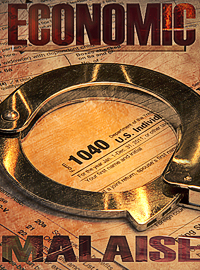| Congressman Camp Proposes Tax Reform to Simplify Code, Lower Rates and Promote Growth |
 |
|
By Timothy H. Lee
Thursday, February 27 2014 |
Cyclical recessions and recoveries come and go. That’s the nature of a market economy. Unfortunately, the current recovery under the Obama presidency is distinguished for its status as the most sluggish in recorded U.S. history. That’s not by coincidence, but rather the consequence of his growth-killing bigger-government policies. Fortunately, there’s something being done about it, and it’s something that already constitutes a rare opportunity for bipartisan action. This week, Congressman Dave Camp (R – Michigan) proposed a bold overhaul of our bloated and Byzantine current tax code, which even Senator Ron Wyden (D – Oregon) labeled “a breakthrough.” While Camp’s reform remains subject to negotiation and further analysis, former Senator Phil Gramm optimistically observed that it offers “a glimmer of hope for the economy and deficit reduction.” So just how has the now five-year-old Obama “recovery” been? Here are some of the ugly realities, which illustrate the desperate need for something to spark growth. The non-partisan Congressional Budget Office (CBO), which may soon find itself the target of Obama’s notorious wrath if it continues to issue discouraging words regarding ObamaCare and other administration policies, recently released a report highlighting not only the severity of our economic malaise, but also its resulting negative impact on federal deficits and debt. According to the CBO, we’ve suffered $4.9 trillion in lost federal revenues due to slower growth since the recession began in 2007. Obviously, Obama’s policies cannot be held responsible for the recession itself. But here’s something notable, as summarized by Senator Gramm: “[A]bout half the losses are due to the weak recovery, with $2.3 trillion in projected revenue losses occurring after the White House’s announced ‘summer of recovery’ began in 2010.” The recession itself officially ended a year before that in June 2009, almost five years ago now. That same year, when Obama, Pelosi and Reid imposed their nearly trillion-dollar “stimulus,” they projected that unemployment would not rise above 8%, and the economy would grow 4.2% through 2013. Instead, unemployment surpassed 10%, and remained above 8% for the longest stretch in recorded history. Median household income is down 4.4% not from pre-recession levels, but since the recession ended in 2009. Meanwhile, since World War II the U.S. has averaged an annual growth rate of 3.2%, but in this “recovery” we’ve witnessed growth below 2%. Now the CBO forecasts that the combination of that weak recovery and ObamaCare’s impact will lead to just 2.2% growth over the next decade. As a result, the CBO has swung from predicting $617 billion in new revenues after Obama raised tax rates starting in 2013 to $1.4 trillion in lost revenues. One cause of that ongoing stagnation is our bloated and outdated tax code. That’s where Camp’s tax reform effort comes in. As summarized by The Wall Street Journal, “The Chairman of the tax-writing Ways and Means Committee wants to lower tax rates and create a fairer, more efficient tax code, and his plan ought to shift the debate over taxes to growth from redistribution.” Camp’s proposal reduces our current set of seven income tax brackets to three – 10%, 25% and 35%. Fully 99% of filers would fall into either the 10% or 25% bracket, with those earning over $400,000 (or $450,000 for married couples) falling into the top 35% bracket. The bill would also increase the standard deduction to $11,000 for individuals ($22,000 for joint filers), and simplify the code so that 95% of filers would no longer need to itemize (up from approximately 70% today). For those 5% who continued to itemize, however, the reform would maintain such features as the charitable deduction as well as the mortgage interest deduction for all existing loans (and up to $500,000 for future loans). There’s more good news. The U.S. corporate tax rate, currently the world’s highest at 35% (even higher when state corporate taxes are considered), would be reduced to a more rational and competitive 25% (near the developed world average 26.6%). Camp’s proposal also repeals two hated ObamaCare taxes – on medical devices and over-the-counter drugs, it eases expensing for small- and medium-sized businesses that create most new jobs in America, it repeals the defective alternative minimum tax (AMT) and it ends state and local income tax deductions that cover for states and localities with high tax rates. Camp’s reform also prohibits the attempted IRS takeover of the tax preparation industry, which we addressed in a commentary earlier this month. Naturally, a proposal this bold and comprehensive raises some concerns. For example, the initial draft keeps capital gains tax rates too high, it could favor corporate income over successful partnerships or S-corporations and it taxes “carried interest” investments as ordinary income instead even though returns on risk aren’t guaranteed income in the same way a job paycheck is. That said, the CBO projects that Camp’s reform proposal would increase economic growth by $3.4 trillion and add nearly 2 million jobs over the upcoming decade. Moreover, the Joint Tax Committee predicts that it will boost tax receipts some $700 billion by spurring economic and job growth. So Camp’s reform proposal would boost growth, add jobs and help reduce our debt. And according to the initial analysis from Americans for Tax Reform, “The Camp draft is a net tax cut and a net spending cut.” Not bad so far. Nearly three decades have passed since the comprehensive 1986 tax reform, and during the ensuing years the code has become a drag on our economy and budgetary health. Accordingly, we desperately need comprehensive reform to simplify the code and lower rates, and Chairman Camp’s proposal looks like a critical jolt in that direction. |
Related Articles : |
























